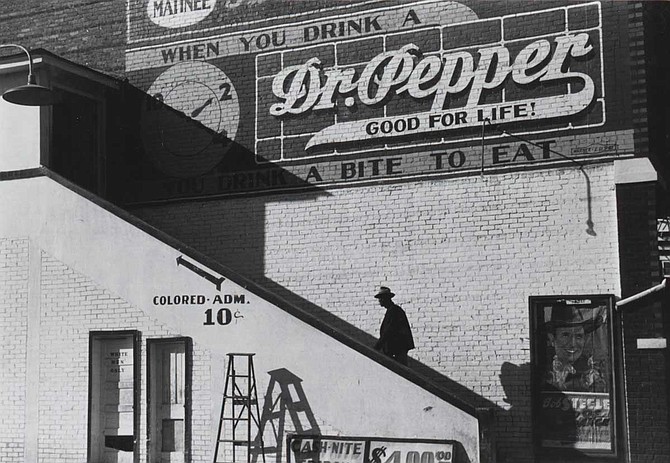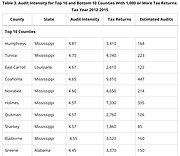An African American man enters the "colored" entrance of a segregated movie theater in Belzoni in Humphreys County, Miss., in 1939. Photo by Marion Post Wolcott
JACKSON — A new study of IRS practices reveals a tale of two Mississippi counties, with one of the poorest in the state earning the top spot as the most audited in the country, while the second-wealthiest is Mississippi's least audited.
Like all top five counties on the list, Humphreys County, which lands at No. 1, is a rural and mostly African American county in the Deep South. The other four counties are (in order): Tunica County, Miss.; East Carroll Parish, La.; Coahoma County, Miss.; and Noxubee County, Miss. Tax Notes published this list in a report on Monday.
By comparison, Rankin County has a median household income of more than double that of Humphreys, and is one of the whitest counties in the state—but it is the least audited one. White residents account for 81 percent of its population, while just 17 percent is black—significantly lower than the statewide population, which is 37 percent African American.
The disparity, highlighted in a report published in ProPublica, results from the agency's heavy focus on scrutinizing recipients of earned income tax credit, or EITC, an anti-poverty program that provides refunds to families who work but still have difficulty making ends meet.
Since 2011, budget cuts to the IRS have caused audit rates to fall across the board. For families making between $200,000 and $5 million, they have fallen more than 70 percent, while audit rates for those making $5-$10 million have fallen 57 percent. For EITC recipients, who on average make less than $20,000 a year, though, audit rates have fallen the least, dropping just 36 percent.
A ProPublica analysis in December found that the average EITC recipient is more likely to face an audit than someone making 20 times as much. The report attributes the relentless focus on tax-credit recipients to "consistent pressure from Republicans in Congress" to curtail overpayments to people who claim the credit in error.
"Meanwhile, there hasn't been similar pressure to address more costly problems, like tax evasion by business owners," the report notes.
Democratic Sen. Ron Wyden of Oregon, who is the ranking member on the Senate Finance Committee, told ProPublica that the IRS needs more "manpower" to focus on "tax cheats of all sizes."
"Those struggling to make ends meet are being unfairly audited while the fortunate few dodge taxes without consequence," he said in December.
The audits can cause refund delays for families who already live month-to-month.
About 75 percent of Humphreys County is black, and the median household income is a little more than $20,000. A third of families there live in poverty, and among children under 18 alone, the poverty rate tops 50 percent. Among all counties nationwide, Humphreys is the seventh poorest.
Still, the county has its positive economic claims, too. Former Gov. Cliff Finch nicknamed Humphreys the "Farm-Raised Catfish Capital of the World" in 1976. Despite its poverty rate, that title remains accurate today; about 60 percent of the country's farm-raised catfish is raised near Belzoni, its county seat.
Belzoni, which sits on the banks of the Yazoo River, has a storied history. It once hosted slave-worked cotton plantations before the Civil War. In 1955, it earned the title of "Bloody Belzoni" after the murder of George W. Lee, a black minister and civil-rights activist who fought for voting rights for African Americans in the Delta. His murder remains unsolved, and Mississippi Gov. Hugh L. White refused to investigate the killing.
Margot Adler, who later became an NPR correspondent, was active in Belzoni's voter registration efforts in 1965—just prior to the passage of the Voting Rights Act.
"I remember how difficult it was to register people: the fear was palpable," she told CRMVet.com in 2000. "I remember that after one month of daily work there were only seven people registered, and a bunch of us almost got ourselves killed after being chased onto private property by a group of men who belonged to the White Citizens Council."
Four additional Mississippi counties and one Alabama county round out the list of the 10 most audited, starting at No. 6 with Holmes County, Miss., followed by: Quitman County, Miss.; Sharkey County, Miss.; Claiborne County, Miss.; and Greene County, Ala.
Follow state reporter Ashton Pittman on Twitter at @ashtonpittman. Email story tips to [email protected].
More stories by this author
- Governor Attempts to Ban Mississippi Abortions, Citing Need to Preserve PPE
- Rep. Palazzo: Rural Hospitals ‘On Brink’ of ‘Collapse,’ Need Relief Amid Pandemic
- Two Mississippi Congressmen Skip Vote on COVID-19 Emergency Response Bill
- 'Do Not Go to Church': Three Forrest County Coronavirus Cases Bring Warnings
- 'An Abortion Desert': Mississippi Women May Feel Effect of Louisiana Case



